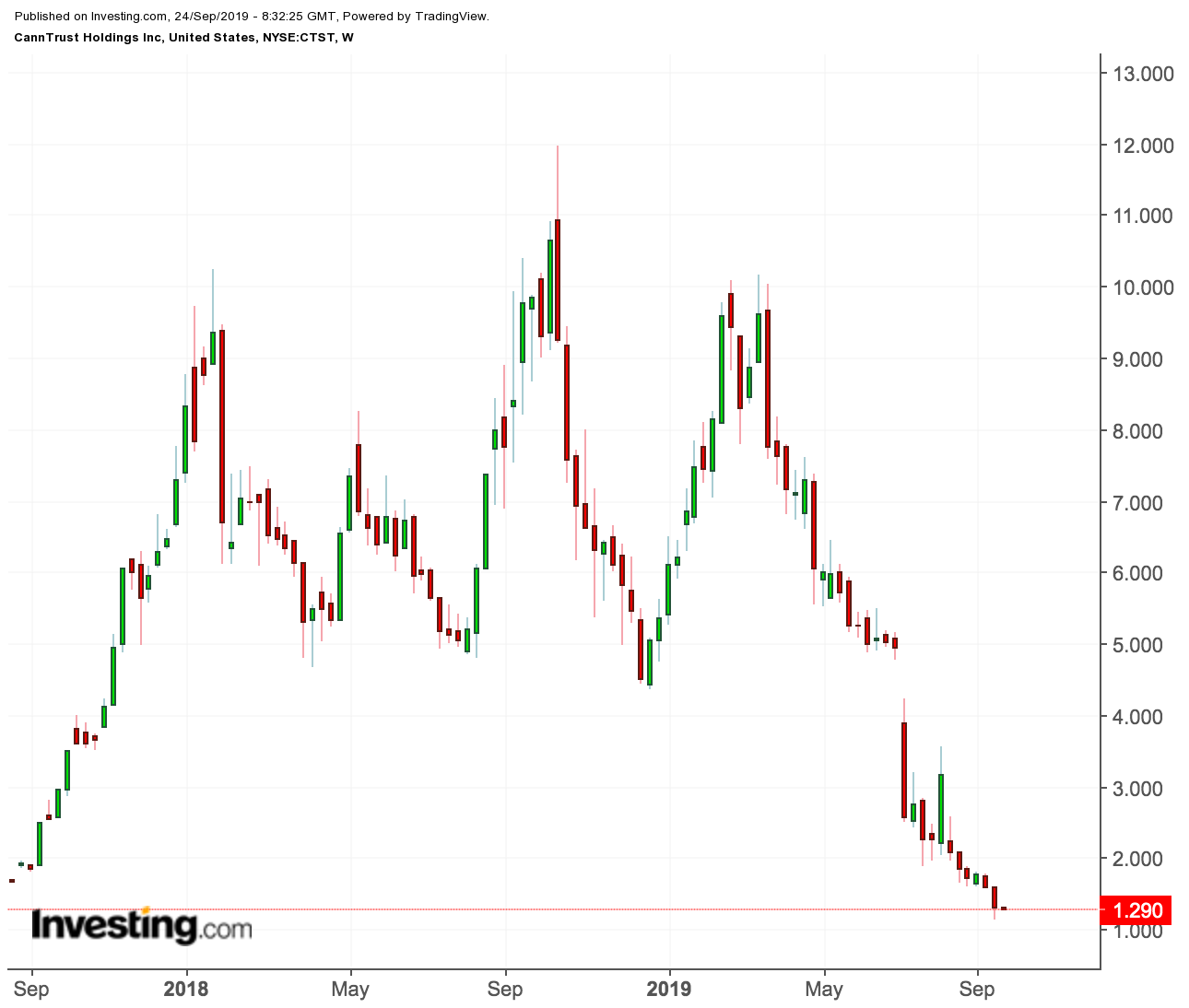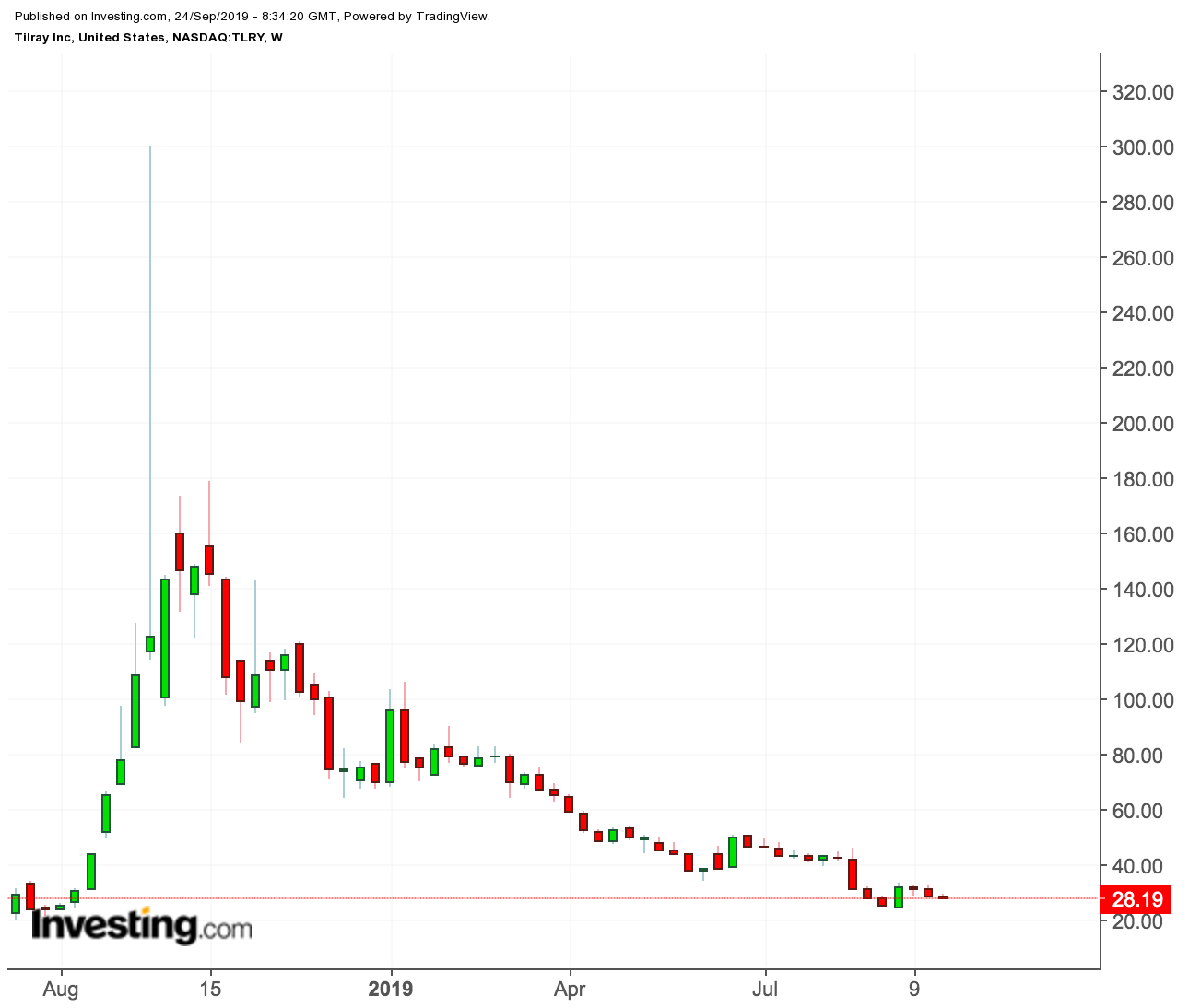It's been a year since the meteoric rise of cannabis stocks, which occurred in the weeks just before the legalization of marijuana in Canada last October. Since that time the landscape in the sector has shifted—dramatically.
Many of the major players that emerged at that time with headline-grabbing stock price hikes are far from the best performers in the market today. In fact, some of the major Canadian-based pot companies are among the worst performers of late.
Rollercoaster Ride
Just last week, some of the biggest names in Canadian cannabis were among the 12 worst performing stocks on the S&P/TSX Composite, the leading index in Canada. They held five of the top 12 position on the list of stocks that recorded the largest losses in the week.
These companies, which are also traded in the U.S., included the embattled CannTrust Holdings (NYSE:CTST), (TSX:TRST), down 14.57% last week; Cronos Group (NASDAQ:CRON), (TSX:CRON), which shed 9.8% in the same period; followed by Canopy Growth (NYSE:CGC), (TSX:WEED), down 8.99; Aphria (NYSE:APHA), (TSX:APHA), down 7.35; and Aurora Cannabis (NYSE:ACB), (TSX:ACB), down 6.47%.
Many cannabis stocks have been on a virtual rollercoaster ride in the last 12 months, reaching unprecedented peaks and neck-wrenching dips. The latest downward trend, however, has been almost constant since this past spring. In fact, since April, the Global Cannabis Competitive Peers Index has recorded about a US$25-billion (C$33 billion) loss. Yes, that’s right...$25 billion U.S. dollars.
Biggest Disappointments
The two biggest disappointments have been the scandal-plagued CannTrust Holdings and the U.S-traded Tilray.
CannTrust has been in a death-spiral since July when it was disclosed to have been growing weed in unlicensed space in its greenhouse facilities in Ontario. That original admission has been followed with a series of headlines, including how top company officials were aware of the illegal growing operations and had attempted to hide these plants by installing false walls, in a bid to conceal it from regulators.
Despite firing its CEO, the company last week was stripped of its growing licences. It can no longer sell or produce marijuana. Next week, it will be delisted from the Toronto Stock Exchange, a direct result of the company falling below the minimum standards for remaining on the index.
CannTrust stock has gone from US$10.04 (C$13.45) on March 27, to closing at US$1.29 (C$1.68) yesterday on the New York Stock Exchange, a drop of more than 87%.
In the case of Tilray (NASDAQ:TLRY), its story of massive stock declines had nothing to do with scandal or regulatory breaches. Its tale is one of simple unprecedented volatility. One that—in the span of one day almost a year ago—saw shares almost double before sliding back, but finishing the trading day up about 40%. Nonetheless, one year later, the stock is down more than 80% overall, and almost 90% from that fateful intraday high in September 2018.
Tilray, based in Nanaimo, B.C., and traded only in the U.S., saw its shares on Sept. 19, 2018, hit close to US$300 (C$397.6). By mid-October 2018, they had slipped to US$165 (C$218.7) Yesterday, they closed at US$28.16 (C$37.3).
Brace yourselves for the next chapter as the second phase of legalization in Canada comes into effect next month, as edibles get the green light for retail sale. What might temper the volatility this time is the fact that most will only be in stores by mid-December, due to regulatory delays.
U.S. House of Representatives Votes on Cannabis Banking Bill this Week
The U.S. House of Representatives is expected on Wednesday to vote on the long-awaited Secure and Fair Enforcement Banking Act, also known as the cannabis banking bill.
The legislation would allow major U.S. banks to provide services to companies in the legal marijuana sector. It is touted as a major step toward federal legalization in the U.S. But once the bill gets passed the House, it still has to pass the U.S. Senate. It’s a step, but there is still a way to go.
